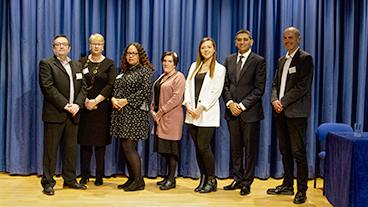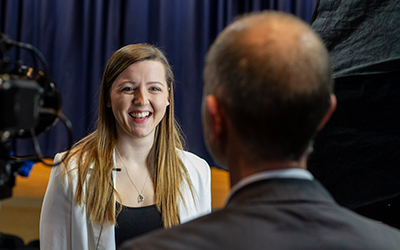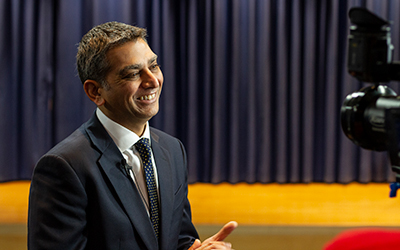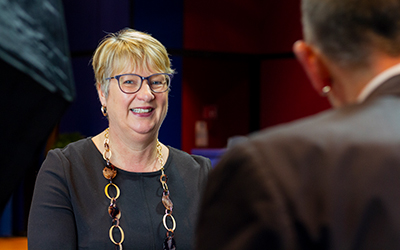You are here
- Home
- Employer webinar: The impact of apprenticeships in the workplace
Employer webinar: The impact of apprenticeships in the workplace

The Open University recently brought together a panel of experts to discuss the impact of apprenticeships in the workplace in advance of National Apprenticeship Week 2020.
The theme of this year’s National Apprenticeship Week is ‘Looking Beyond’.
Our expert panel focused on four key areas:
- Measuring impacts on individual apprentices
- How to measure impacts on the business
- How apprenticeships can diversify the workforce
- Demonstrating the value of apprenticeship programmes
The Levy, which is almost three years old, is being used across England, but the discussion of how apprenticeships are currently working and the impact they are having is relevant across the UK as a whole. The discussion was very timely and relevant to this year’s theme of ‘Look Beyond’.
So, what did our panel say? We have outlined the key points below.
Measuring impacts on individual apprentices

One of the most powerful comments came early on in the discussion from Sarah Farley, a former apprentice herself and Future Careers Lead at Unilever. She said: “I definitely don’t think I would be in the position that I am now if I hadn’t done both of my apprenticeships.” That is something that many apprentices say about their qualification(s) and how it has helped them progress their career.
A key benefit for apprentices is the ability to learn and gain new qualifications, while still earning, with a lot of coaching and mentoring support. Learning and working at the same time enables them to apply and consolidate practical and theoretical learning in real-time. A key element of every apprenticeship is the 20% that is ring-fenced for learning each week.
The experts unanimously agreed that the 20% element is vital and is hugely beneficial both to apprentices and their employers. “They bring the learning back into the workplace and evidence their learning through the day job. We know through evidence, through staff one to ones and through our appraisal systems, that their capability is building and their capacity,” says Kate Kelly, Learning and Development Manager at Public Health England.
Anne Ashworth, Head of Employee Apprenticeships at the education and learning company Pearson, says there are clear, measurable indicators about the impact for apprentices, starting with the knowledge, skills and behaviours that they acquire along the way. Organisations can also measure how far apprentices progress in terms of promotion and speed of promotion, where they are when the apprenticeship ends and at ongoing performance reviews.
The fact that employers have a proactive role to play in what the learning entails, including the 20% off the job learning, means that everything is tailored to both individual and organisational needs. This means that every apprentice has a highly relevant, applicable learning pathway, linked to key business objectives.
How to measure impacts on the business
There are several ways that organisations can and are measuring the business impact of apprenticeships – traditional HR data such as employee attraction, retention, productivity and performance, for example. Also, by tracking apprentices’ progress in the organisation. “Where I have new staff coming in to do an apprenticeship, about 80% of them will stay with us,” says Kelly. “Those apprentices come in at an entry level grade and they are all now on the next grade. Some of them are even two higher grades up. We are retaining them because we are investing in them.”
Lucy Hunte, National Programme Manager of Apprenticeships at Health Education England says that when an organisation provides clear, visible career pathways, it encourages people both to join and stay. “If you can offer a potential apprentice a pathway up from Level 2 up to Level 7, and map that out, that could mean they are with you for ten years. That’s a win by anyone’s book.”
The panellists said their organisations are measuring impact through a mix of personal development reviews, staff appraisals and surveys and through ongoing discussions and feedback opportunities with apprentices and line managers. Dave Oxley, Apprenticeship Programme Director at DHL UK, says the organisation’s degree apprenticeship programme aligns with its future leaders programme. “So there is a pathway and a development programme that they must follow. It needs to be performance measured against a set criteria and also achieving the business targets of the areas they are working in.”
KPIs need to be set from the outset and organisations need to constantly refer back to those KPIs and ensure they are being met. Anne Ashworth says having a strong set of KPIs enables organisations to have really good, measurable data that they can share with senior leaders, apprentices, line managers and any other stakeholders.

Viren Patel, Director of the Business Development Unit at The Open University, says apprentices bring diversity of thinking. “We have seven apprentices in my team. They bring a lot of energy and a different point of view. We question them and they question things and that makes us think as an organisation about what we should be doing differently and making things better.”
How apprenticeships can diversify the workforce
Apprenticeships encourage and enable people to get qualifications and pursue career paths that might otherwise have been too inaccessible for them. Sarah Farley says Unilever has about 70 degree apprentices on its current programme, with a diverse range of backgrounds and experiences, including parents who are returning to work after looking after children.
There are also people who didn’t think the academic route was for them or who didn’t want to get into debt paying to go through university, but are now developing themselves through an apprenticeship. “You can actually develop a really fantastic talent pipeline,” says Sarah.
Organisations are using apprenticeships to proactively draw in a wider range of people. Public Health England works with ex-offenders and care leavers and with the charity Barnado’s for example. It also encourages more women to take up STEM positions in the organisation.
The supply chain and logistics industry is very male-dominated, but DHL UK is finding that by offering its leadership apprenticeships it has been able to attract many more women into the sector. It’s also been able to revitalise the career aspirations of existing workers by offering up new career paths.
By having a more diverse and inclusive workforce, organisations gain diversity of thinking and decision making.
Demonstrating the value of apprenticeship programmes
In order to convince people, internally and externally, of the value of apprenticeships, organisations have to demonstrate that value. Anecdotal evidence is good, such as sharing stories around the business and on social media, because stories really resonate with people. “We have a mum of seven children who has completed a Level 3 healthcare apprenticeship, is now doing Level 5 nursing associate and plans to become a registered nurse. When you share inspiring stories people do actually listen and think this could be me. Or they go back to their organisation and say ‘Why are we not offering these opportunities to our staff?’,” says Lucy Hunte.
There is still a lot of work and myth-busting to do to demonstrate the real value of apprenticeships. Lucy Hunte says this means engaging with people, having conversations about the value and realities of apprenticeships. It means going to events and into schools and colleges and into businesses, getting the message out there and sharing case studies.

Anne Ashworth says there is an increasing amount of data that demonstrates the value of apprenticeships. That data needs to be shared widely with the right audiences. “We present the data to senior leaders, from a financial perspective, but also in terms of learner experience and ROI. We also produce data for our apprentices and line managers so that they can see the tangible impact in data. It also forms part of our public promotion of apprenticeships.”
Before embarking on any apprenticeship programmes, it is vital that an organisation has the senior team on board. Dave Oxley says his organisation ran webinars and Q&A sessions with senior leaders and talked to them about the benefits. Now, some of those leaders are the strongest advocates. Some of them are even now doing higher-level apprenticeships themselves, a sure sign of their belief in and commitment to apprenticeships.
The OU has offered apprenticeships since 2016. Programmes are available in England, Scotland and Wales and more than 550 employers have chosen the OU’s flexible delivery model to upskill and reskill both new and existing staff. In England, the OU is now one of the largest providers of degree apprenticeships with almost 2,000 learners on programmes. The University now offers apprenticeships in nursing, social work, policing, digital, leadership and management.
The panel
Viren Patel, Director, Business Development Unit at The Open University
Dave Oxley, Apprenticeship Programme Manager at DHL UK
Anne Ashworth, Head of Employee Apprenticeships at Pearson
Sarah Farley, Future Careers Lead and former apprentice at Unilever
Lucy Hunte, National Programme Manager – apprenticeships at Health Education England
Kate Kelly, Learning & Development Manager at Public Health England
Chair, Martin Couzins, Corporate Learning Journalist
Find out how we can help your organisation
Please contact us to speak to one of our business team advisors.
Not on our mailing list?
Sign up to receive regular emails that are full of advice and resources to support staff development in your organisation.